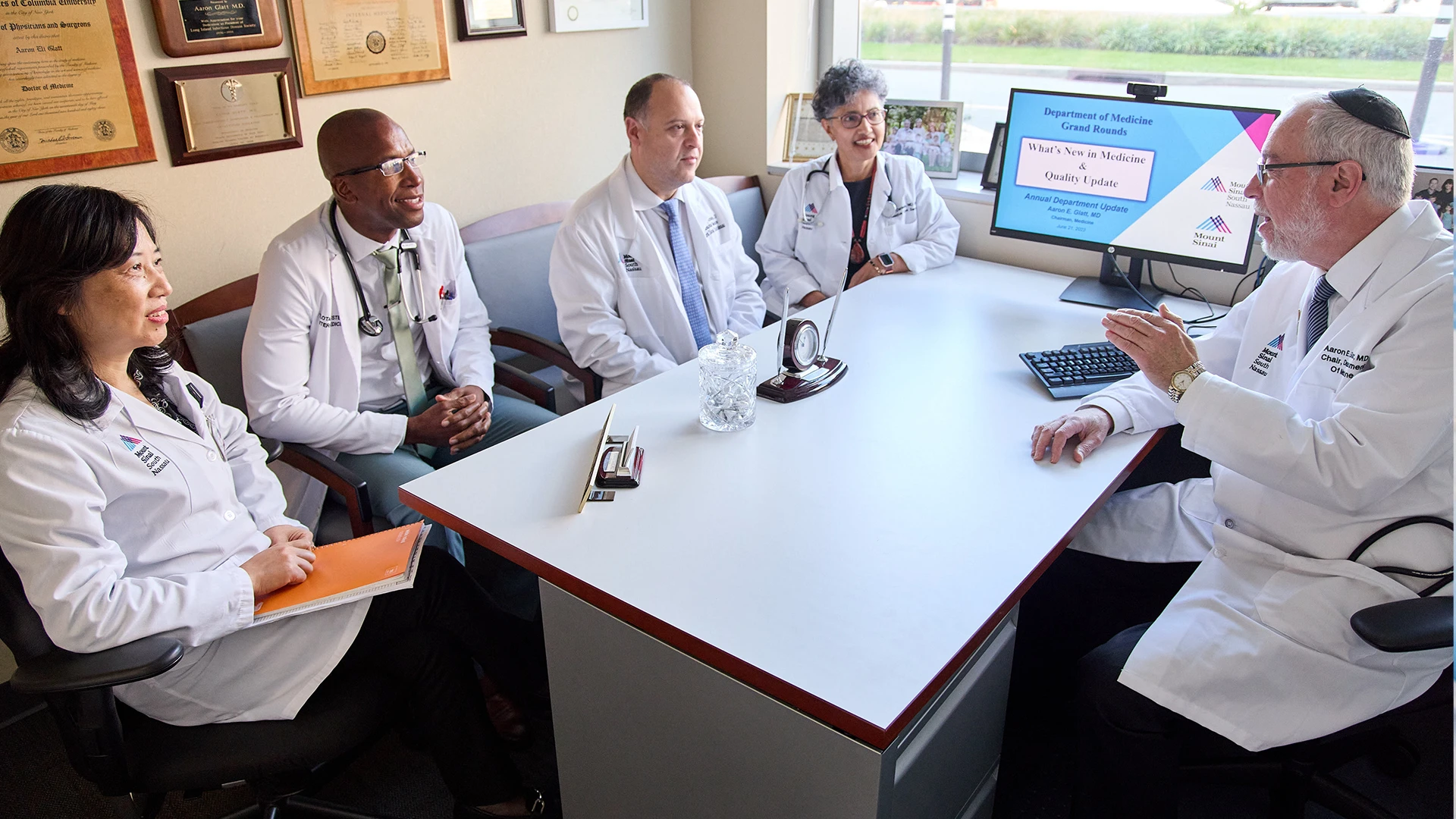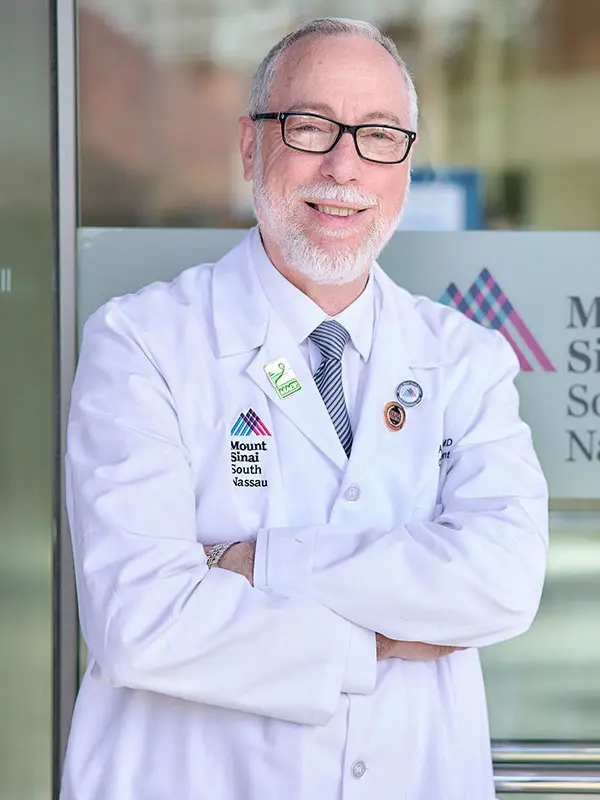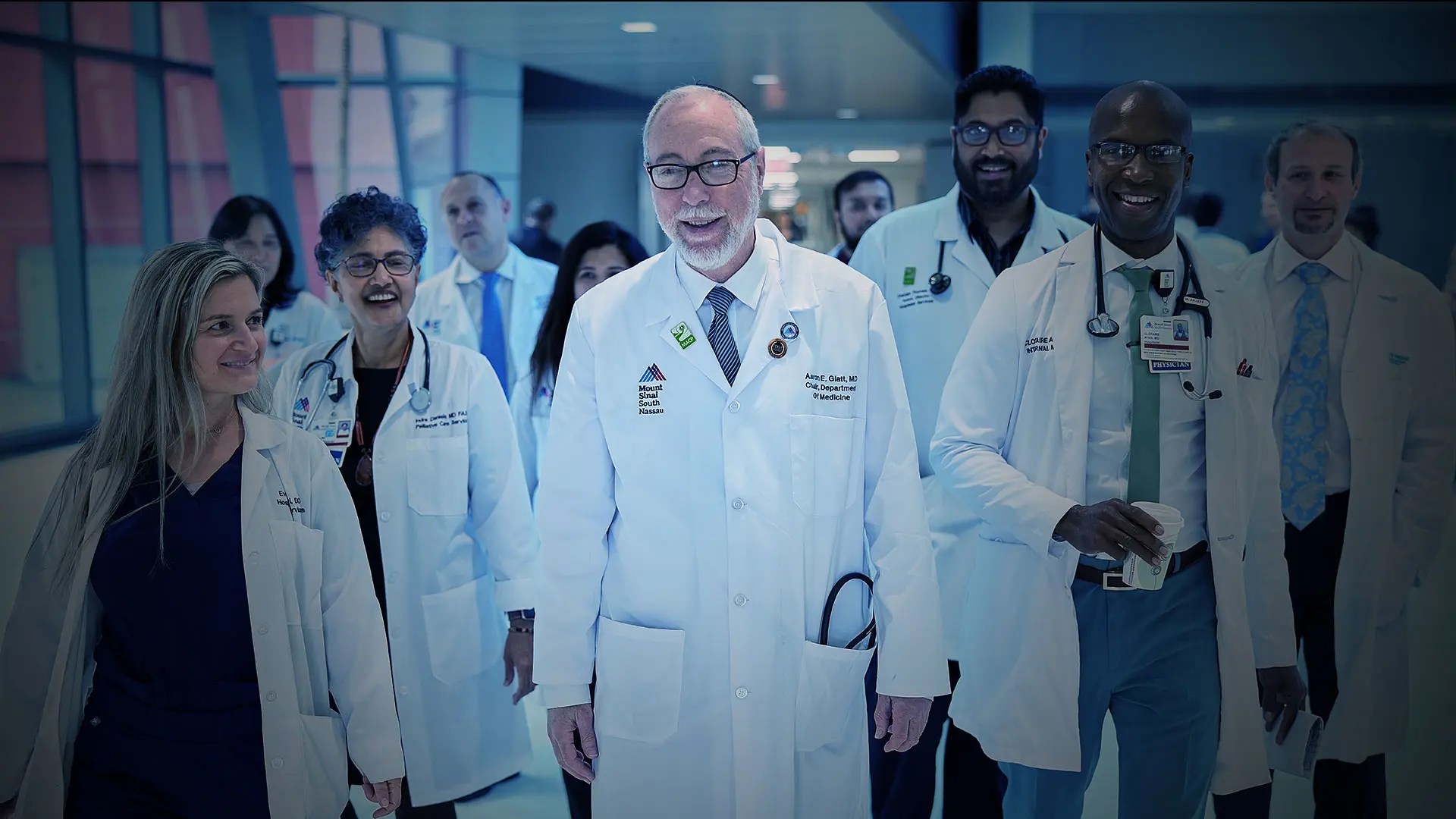Five years after becoming Mount Sinai’s flagship hospital on Long Island, Mount Sinai South Nassau is growing in a way that is impossible to miss. Initiatives range from the ongoing half-billion-dollar construction project that includes the sleek Feil Family Pavilion on its main campus in Oceanside, to an expanded internal medicine residency training program, to ambitious plans underway to become a regional center for cardiac surgery and thrombectomy-capable stroke treatment.
For the roughly 900,000 residents the hospital serves on the Island’s South Shore, that new footprint brings to their community the kind of specialized medical services they previously had to go to Manhattan to access.
“We were always a very successful community hospital, but since joining Mount Sinai we’ve become an even stronger and larger academic tertiary care center that still has a very unique and nice community hospital feel,” says Aaron Glatt, MD, MACP, Professor of Medicine (Infectious Diseases) at the Icahn School of Medicine at Mount Sinai and Chair of the Department of Medicine at Mount Sinai South Nassau. “We’ve enjoyed a very collegial relationship and exchange of services and doctors that are allowing our patients to get the same great quality of Mount Sinai care right in their backyard.”
Cardiovascular care drives the point home. While the hospital has maintained for years a recognized Center for Cardiovascular Health—it’s the only acute-care center on Long Island’s South Shore to perform emergency and elective angioplasty—it has been limited by its lack of onsite cardiac surgery.
That will soon change upon completion of the Feil Family Pavilion, which includes new operating rooms, surgical beds, and an intensive care suite, setting the stage for a vastly expanded cardiac surgery and interventional cardiology program expected to begin in the summer of 2025. The program will include specialists from the Mount Sinai Health System (including Mount Sinai South Nassau) performing and training others in surgical procedures such as TAVR (transcatheter aortic valve replacement) for patients with severe aortic stenosis, and left-sided transseptal ablation for atrial fibrillation. Enhancing that capability will be the migration of Mount Sinai South Nassau to Mount Sinai’s Epic electronic health records system.

Haiwen Ma, MD; Clotaire Ariste, MD; Dmity Konsky, DO; Indra Daniels, MD; and Aaron Glatt, MD, are among the intrepid team of clinicians at Mount Sinai South Nassau who have established it as Long Island’s premier hospital for cardiovascular and cancer treatments with excellent outcomes.
Cancer treatment is another specialty benefiting significantly from the Mount Sinai connection. A Joint Comprehensive Cancer Center at Mount Sinai South Nassau gives patients access to cutting-edge clinical trials and treatment in conjunction with Mount Sinai’s oncology team at its main campus in Manhattan. An integral and robust part of that joint effort is infusion services offered locally and regionally for both oncology and non-oncology patients across the Mount Sinai Health System. The program also plans to expand academically. Elaborates Dr. Glatt: “The potential for our hospital to offer fellowships in cardiology, oncology, and other medical specialties, in addition to our current gastroenterological fellowships, is one of the most exciting prospects on our horizon.”
Under the banner of Icahn Mount Sinai, Mount Sinai South Nassau has already received approval from the Accreditation Council for Graduate School Education to enlarge its Internal Medicine Physician Residency Program from 30 to 39 slots next summer. The hospital also maintains residency training in surgery, obstetrics and gynecology, podiatry, and family medicine.
Clinically, Mount Sinai South Nassau is working toward having a Level III Neonatal Intensive Care Unit, building on its Level II status while enhancing high-risk obstetrical care for Long Island’s South Shore. The hospital currently delivers more than 2,000 babies a year. In terms of ambulatory care, Mount Sinai South Nassau has 37 sites outside its main facility where physicians practice primary and specialty medicine, and recently built an advanced 15,000-square-foot medical arts pavilion in Long Beach. That community is also the site of a free-standing, full-service Emergency Department (ED), one of only a handful in New York State, and the Feil Family Pavilion project will include a doubling in size of the hospital’s main ED.
True to its roots as a community hospital, Mount Sinai South Nassau takes particular pride in its extensive outreach program. That effort gained high visibility during COVID-19, when its distinctly marked mobile vaccination bus (the “Vaxmobile”) traveled up to six days a week to hard-hit communities to administer vaccines and boosters to all eligible residents, as well as to provide treatments such as Paxlovid after they became available. The outreach now brings to the region’s towns and neighborhoods a multitude of health screening programs, including ones for breast cancer, cardiovascular/blood pressure, prostate cancer, and dermatological/melanoma. In addition, clinical professionals frequently appear before community groups to give lectures on proactive health care.
Given Mount Sinai South Nassau’s full range of clinical, ambulatory, and community services, it’s not surprising that the hospital is perennially ranked among the “Best Regional Hospitals” in the metropolitan area by U.S. News & World Report® with recognized expertise in 10 areas, plus recognition from the Infectious Diseases Society of America as a “Center of Excellence” in Antimicrobial Stewardship.
“Many of us live in the neighborhood,” acknowledges Dr. Glatt, himself a frequent community lecturer, “and we’ve all worked extremely hard to make Mount Sinai South Nassau a hospital where our own families and friends can get the finest-quality medical care around.”
Featured

Aaron Glatt, MD, MACP
Chair of the Department of Medicine, Mount Sinai South Nassau
